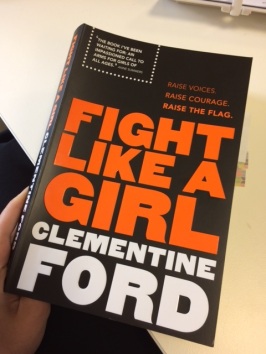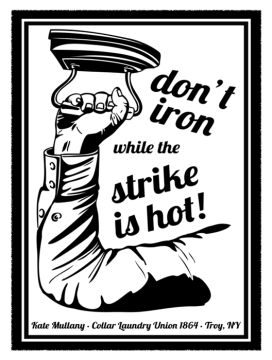 Last night I was lucky enough to see Clementine Ford launch her book Fight Like a Girl at Melbourne’s Athenaeum theatre. I was keen to hear Ford talk, to come down from my ivory tower in the academy and see what mainstream feminism in Australia had to say. I was struck by how much I looked like all the other women there, with my Gorman clothing and my “alternative” haircut, and my not being a man.
Last night I was lucky enough to see Clementine Ford launch her book Fight Like a Girl at Melbourne’s Athenaeum theatre. I was keen to hear Ford talk, to come down from my ivory tower in the academy and see what mainstream feminism in Australia had to say. I was struck by how much I looked like all the other women there, with my Gorman clothing and my “alternative” haircut, and my not being a man.
Ford was charismatic and had loads of interesting anecdotes about sexism. I was struck by her “giving no fucks” attitude, and deep concern for the lives of women. Interestingly, Ford called for a new version of “radical feminism” for the contemporary world. But when MC Julia Baird asked, “So, how do you fight like a girl?”, I was surprised that Ford had little to say other than along the lines of “‘girl’ has become synonymous with ‘shit’, so we have to own it instead of be ashamed”. The suggestion seemed to be that fighting like a girl, boiled down to just being a girl.

Reading selfie
Throughout Fighting Like a Girl, Ford documents the sexism she has experienced in her life in meticulous autobiographical detail. She talks for example about the stigma around abortions, the difficulty of having mental health issues as a woman, the mixed emotions of pregnancy, and grappling with body image issues and eating disorders. Ford’s reflections are refreshingly blunt. I particularly liked her point toward the end that, “We should be angry. Because if we aren’t, we aren’t paying enough attention” (271). I have often advocated the value of anger and the way that women’s expression of anger is derided.
But while Ford outlines all of these issues and rallies us for anger, there is a little direction about what to do with it.

Clementine Ford
But while some of these options may assist in surviving a sexist world, I am dubious about how effective they are for dismantling sexism. I feel like masturbating in your bathtub just ain’t gonna cut it.

An excellent slogan from the strike in 1970
 However, the feminism of the 1970’s was not without its problems. Many women of colour raised important issues about what mainstream feminism was hoping to achieve – the question became: feminism is liberation for whom? Women of colour such as bell hooks highlighted how they faced a double burden of both sexism and racism. As The Combahee River Collective pointed out in 1974:
However, the feminism of the 1970’s was not without its problems. Many women of colour raised important issues about what mainstream feminism was hoping to achieve – the question became: feminism is liberation for whom? Women of colour such as bell hooks highlighted how they faced a double burden of both sexism and racism. As The Combahee River Collective pointed out in 1974:
Although we are feminists and Lesbians, we feel solidarity with progressive Black men and do not advocate the fractionalization that white women who are separatists demand.
The Collective was fundamentally concerned with building coalitions to fight racism and sexism, because of the shared interests that cut across gendered lines.

Michaelia Cash and Pauline Hanson
Fundamentally this approach is based in “identity politics”. Identity politics is problematic because it sees identity as a source of both oppression and resistance – politics is founded at the site of identity. This also leads to the problematic idea that all women have shared interests, so for example, at least on some level I am supposed to get on board with feeling my sisterhood with right-wing racist women like Julie Bishop, or Michaelia Cash or Pauline Hanson, i.e. celebrate women in power. Never mind if they’re involved in locking up and torturing refugee women, or advocating for the end of Muslim migration. Identity politics is how we get to the idea that “fighting like a girl” is simply about “being a girl”.

LOL
Let me just pause here to say I’ve experienced my fair share of sexism. I’ve been in many a relationship with a man and bore the burden of domestic and emotional labour. I’ve sat through endless philosophy classes with arrogant boys and cried on my walks home over feeling silenced. I’ve experienced sharp sexism on the streets and in the academy, and had grown men scream at me for being a confident woman. My current partner is a woman, and I can see that the way we relate intimately and domestically is affected by the gender scripts we have grown up with.
Sexism is real.
 I also definitely take Ford’s point that the whole “male champions of change” thing is a joke. Going to an International Women’s Day breakfast only to be talked at by endless male speakers “standing up for change” is pretty ordinary, as is being part of any space where men are in the minority but feel the need to dominate verbally. But I think what’s wrong with most of these “male champion” ventures (the White Ribbon campaign being one of the cases Ford discusses) is that they’re not actually doing anything.
I also definitely take Ford’s point that the whole “male champions of change” thing is a joke. Going to an International Women’s Day breakfast only to be talked at by endless male speakers “standing up for change” is pretty ordinary, as is being part of any space where men are in the minority but feel the need to dominate verbally. But I think what’s wrong with most of these “male champion” ventures (the White Ribbon campaign being one of the cases Ford discusses) is that they’re not actually doing anything.
Let’s imagine for a second that there was a mobilisation against sexism at universities across Australia to stop rapes on campus and let’s say it involved everyone striking – teachers, students, everyone. In this scenario, to be honest, if every guy wanted to be a “champion” by picking up all of the tedious activist organising tasks like arranging email lists, painting banners and setting up information desks at the strike, I would be 100% behind that. Maybe the people who had experienced assault could “carry the flag” as Ford suggests, but the other people could carry the stalls. Bear some burden. Do some boring tasks to educate, agitate, organise. Sounds amazing.
But the theory of “patriarchy” that Ford employs (which the radical feminists of the 1970s certainly also believed in), suggests that there is something fundamentally essentially wrong with masculinity. It locates the cause of sexism in masculinity, rather than seeing masculinity as a symptom of a larger structure that is not only promotes sexism but also racism, and every other “ism” you can think of.
 In contrast to Ford’s identity politics and patriarchy theory, we could imagine a politics which attends to issues of identity, which recognises that sexism disproportionately affects people of different identities in different ways, but which doesn’t found the political moment in identity itself.
In contrast to Ford’s identity politics and patriarchy theory, we could imagine a politics which attends to issues of identity, which recognises that sexism disproportionately affects people of different identities in different ways, but which doesn’t found the political moment in identity itself.
What this alternative to identity politics really boils down to then isn’t identity at all, but a material relation to the world. It’s class politics.
Class isn’t about identity per se but a relationship to production. If you work for a wage, you are a worker (the working class). If you extract profits from other workers, you are a boss (the ruling class). The system of capitalism needs to divide the working class to maintain control. When workers are united, they have a lot of power (hence why the Turnbull ABCC issue, trying to take away worker power, is such a big deal). Ford touches on capitalism in Fighting Like a Girl, but instead of seeing it as structural cause of division and control, she sees it in terms of merely a “market” which sells things to us. Capitalism certainly does sell things to us, but the main point of capitalism isn’t consumption so much as production. As long as we don’t try to seize the means of production, i.e. control over our own labour, capitalism keeps ticking (though it is in perpetual crisis – another story for another time). The more divided we are, the less able we are to seize power.
This perspective is critiqued for being too simple, too crude for describing the world. It’s pretty uncool to use Marxist theory these days. But I wonder why: perhaps precisely because it cuts to the quick of what’s really going on? Unlike feminism and other identity movements, Marxism appears to be the one thing capitalism struggles to reabsorb and sell back to us.

Hilary Clinton

Fact.
But all of this really makes me think that fighting like a girl has to mean more than just being a girl (or a cisgender woman, or a gay woman…etc). If we’re really going to put up a fight, we better put our collective heads together real quick, before the ocean rises and the earth melts away, before every black man is shot in America and every Australian indigenous person dies in police custody, before everyone is a refugee, before everyone is squeezed until there is nothing more to give.
Sure, unashamedly orgasming in the bathtub isn’t the worst idea in the world. But I really hope that we don’t wait until death is knocking on our door to get out of the tub and join the collective struggle.